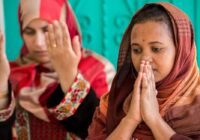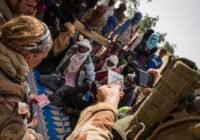Twenty-five years after the Lebanese Civil War, families of 17,000 missing people still have no information about the fate of their loved ones. [Click the image above or scroll down to view the mini gallery.]
It was four months after the disappearance of Alexander Salloum in Beirut in August 1985. The telephone rang in the house where he used to live with his elderly father. Alexander’s father took the phone and heard his son’s voice saying, “Allo, papa, papa …,” then the connection went dead. Jeannine, Alexander’s younger sister, recalls that day and says that one year later her father died of grief over his missing son.
No one knows why Alexander’s car was stopped near the Green Line, which separated East from West Beirut during Lebanon’s civil war between 1975-90. There is no information about the affiliation of militias who abducted him and two of his colleagues.
After 30 years of searching for her missing sibling, Jeannine guesses that her brother was transferred to Syria and his kidnappers let him call his father because that was his last day in Lebanon. “Maybe Alexander begged them to hear his fathers’ voice and they let him just say ‘papa papa’ and nothing more,” she says.
Official data of missing persons in Lebanese police stations shows there are 17,000 people like Alexander who disappeared during the civil war. Twenty-five years after the conflict ended, their relatives still do not have any information regarding their whereabouts and fate.
A 2011 Amnesty International report shows that some disappeared persons went missing after they left their houses to buy a pack of cigarettes. There are examples of others who were asked to accompany intelligence officers for five minutes for questioning about a traffic accident and then never came back. And others may have been killed during battles and massacres.
Taboos of Lebanon’s Civil War
According to humanitarian organizations such as the International Committee of the Red Cross (ICRC) and Amnesty International, missing people are those who are unaccounted for as a result of armed conflict or internal violence and others whose families lost all contact with them. This definition covers a wide range of disappearances — even people who were killed but whose bodies have not been found or identified are classified as disappeared persons.
In 2011-12, the ICRC conducted a survey about missing people in Lebanon based on interviews with family members. According to the survey, 82% of forcibly disappeared Lebanese were civilians, while only 16% were combatants. The average age of missing persons was 28, but one-quarter of those were 18 years old at the time of their disappearance.
The cause of missing people in Lebanon is one of the unhealed wounds of the 15-year civil war. At the end of the conflict, there was no attempt to deal with its legacy. The General Amnesty Law, which was passed by the Lebanese parliament in 1991, pardoned all political crimes committed prior to March 28, 1991. Consequently, the perpetrators have faced no penalties for their misdeeds during the civil war.
In 2007, Lebanon signed the United Nations Convention on the Protection of All Persons from Enforced Disappearance (ICCPED), but international observers state it has failed to meet its obligations. The International Center for Transitional Justice, a nongovernmental organization (NGO) that seeks accountability for war crimes and human rights abuses, has dubbed the country’s refusal to face its past as “state-sponsored amnesia.”
Dima Samira, a post-doctoral research associate at the Lebanese American University, believes that this “state-sponsored amnesia” is a result of Lebanon’s failure to pursue meaningful investigation or debate into the civil war. “State-sponsored amnesia is made more acute by the state’s resistance to and even hindrance of such investigations, despite a number of court rulings and numerous requests by civil society actors,” she tells Fair Observer.
Enforced disappearance has been used during conflicts in different countries as a strategy to spread terror and the feeling of insecurity within society. Cases of missing people in Argentina, Chile, Guatemala and Bosnia are known worldwide, whereas Lebanon’s issue is not. International awareness regarding disappearances in Latin America is a result of national agreements in those countries to resolve the cases of missing persons.
So far, there is no consensus among Lebanese politicians about an official stance regarding the cases of missing persons in this small state. Fabien Bourdier, a delegate of the ICRC’s “Missing Project” in Lebanon, believes this condition will remain unless Lebanese politicians and people change their viewpoints: “In Lebanon, it is still a taboo to talk about this issue. Subsequently it cannot be a well-known case in the international community.”
The Neglected Right
Jeannine’s 300-year ancestral home is located in Dlebta in Mont Liban, a small Christian village about 30 kilometers from Beirut. There is an old photo of Alexander and Jeannine on a small table by the fireplace. The photo was taken one year before Alexander’s disappearance. It shows them in the same house, standing on the balcony on a sunny day. Now the balcony is full of water. Storm Micha swept across Dlebta in November 2014.
By the fireplace in the living room, Jeannine and her friend, Walid Bou Malhab, tell the story of the 30-year search for Alexander. Jeannine remembers different occasions when strangers contacted her and claimed they could provide information about Alexander’s whereabouts in return for money. She paid different people several times, but all in vain. Jeannine even traveled to Syria and met high-ranking officials in the Syrian intelligence service and army, but there was no trace of Alexander.
Lack of information is one of the main hurdles for those who work on this issue in Lebanon. There is no official list with the names of the 17,000 missing people. Even the ICRC and NGOs working on the case of Lebanese disappearances do not have access to detailed data. Due to this lack of information, the fundamental right of relatives to know about the fate of their family members has been neglected for decades.
Since the end of civil war, the Lebanese government on several occasions tried to put an end to the ongoing debate over the conflict’s missing people. In 1991, the government announced that no detainees were held by political parties and shut down private initiatives looking into the issue of enforced disappearances. In 1995, a law declared anyone who disappeared during the civil war as officially dead.
In 2000, the government changed its stance and launched a commission to collect data about the cases of disappeared persons and perpetrators. A two-page report was issued by the commission that said there were only 2,046 missing and advised families of disappeared people to record their relatives’ death. One year later another commission was established to dig for further data, but no report was ever published.
In 2005, a joint Lebanese-Syrian commission was created to investigate all cases of forcibly disappeared Lebanese in Syria. This commission had no result either. It has since, although officially not dissolved, discontinued its work and presented no results. The Syrian government has never acknowledged the detention of Lebanese citizens during the civil war, despite 121 detainees being released from Syrian prisons in 1998 and 54 Lebanese freed two years later in 2000.
In March 2014, the Lebanese government finally recognized some rights of the relatives of missing people — parliament acknowledged that families have the right to know what happened to their loved ones. According to a ruling issued by Lebanon’s State Shura Council, families of missing persons should be able to obtain copies of all documents from the previous inquiries and commissions that worked on the issue.
Despite the establishment of different committees that worked on the issue of missing people in Lebanon, no tangible achievement with regard to the fate of those people has yet been announced. According to Amnesty International, previous investigations by authorities have not been “independent, transparent or effective” and left families of missing people in “anguish and uncertainty.”
ICRC delegate Fabien Bourdier clarifies that, according to ICRC frameworks, those committees were not national commissions: “According to basic international terms, a national commission should be independent from political powers,” he says.
Dima Samira also sees the result of those commissions as a failure. She argues that the state’s reluctance to reveal information is related to a fear that this information “might incriminate state actors, leaders or parties” and might “revive tension.” She also emphasizes the role of the Syrian government: “Another reason is the Syrian regime’s refusal to reveal information regarding Lebanese detainees in its prisons.”
Economic and Administrative Hurdles
On October 14, 2014, Arabic coffee and cookies were prepared for at least 40 guests in the eastern Sin el-Fil suburb of Beirut. On that day, the ICRC and Act for the Disappeared — an NGO — arranged a meeting to mobilize the family members of missing people from the civil war and to provide them with information regarding the NGO’s activities to collect data about disappeared persons. When the meeting started, there were just eight family members sitting separately in the meeting room.
Justine Di Mayo, the co-funder and director of Act for the Disappeared, says the mobilization of family members of missing persons is a key issue in Lebanon. She says whenever NGOs plan for a demonstration or sit-in, it is difficult to organize “more than 20 families.” After decades of abortive search, relatives of Lebanese disappeared persons do not have hope that any entity can help them. “They don’t believe any more that these acts will change the situation. Family members are disappointed, and in their opinion the Lebanese authority won’t do anything for this issue,” explains Di Mayo.
It is not just the emotional distress that left the family members of disappeared persons in this desperate situation. Aside from the psychological difficulty of coping with uncertainty, wondering and waiting, relatives of missing people also face other difficulties. In most cases, the missing person is a family’s main breadwinner. Subsequently, most of these families face serious economic hardships.
In Lebanon, families are also struggling with legal and administrative obstacles. Relatives of disappeared people cannot spend the missing persons’ money, dispose of their property or access their bank accounts. Wives of missing men suffer from the vagueness of their status of being wife or widow. According to Lebanese law, they cannot apply for a passport for themselves or their children if they are under 18. Without a death certificate, many of these activities are not feasible, but relatives of disappeared persons do not want to declare their loved ones dead.
Di Mayo says one of the reasons for the families’ reluctance to declare their missing relatives dead is because they feel they will “betray” the disappeared person. According to the ICRC survey, 77% of relatives of missing people believe their missing family members are still alive. Bourdier tells Fair Observer that there are families who prepare the dinner table in the same manner every day, as if no one is missing, while others continue to leave the room of their missing person untouched.
Hopes for Future Changes
“Oh Dad, little did we know as we waved you off to work that morning, that it’d be the last that we’d see of you again for a long time – if ever again. To the world, you may be a number, but not to us. You have a name and a life that awaits!” This is a part of Alia’s letter to her missing father, Edward, which was published alongside a hundred other letters in an ICRC booklet in memory of Lebanon’s missing persons. In spite of relatives of disappeared persons still waiting for them, not all Lebanese support them in their cause.
Besides the psychological problems and economic hurdles for relatives of missing people, they also face another social issue. In general, Lebanese have preferred to remain silent about this issue. Contrary to those who have a missing person in their families, other Lebanese believe that these people must accept the death of their relatives and stop waiting for them.
Nowadays, more than two decades after the end of the Lebanese Civil War, many parents of missing people are dead and it was mainly them that led the search for information. Jeannine believes that as time passes, there will be less people who follow these cases. “I understand it if other people, because of their daily problems, cannot pay attention to our issue,” she says. “I cannot understand my government’s negligence, because they are responsible for the missing people.”
Contrary to what people at the grassroots level and politicians contemplate, experts on transitional justice and Lebanese history believe an accurate assessment of the past and dealing with the legacy of Lebanon’s civil war would help the country’s reconciliation. Bourdier explains that the unsolved issue of missing people in Lebanon demonstrates that the civil war chapter of Lebanon’s history is not closed yet. He evaluates this situation as a potential danger for the future. “It means incidents like what happened in the past could happen again. Peoples’ deep awareness about the past could be the best protection for the future.”
The demand for collecting data about the cases of missing people and administrators’ inaction have led the ICRC and NGOs to gather facts and documents about disappeared persons in Lebanon. The ICRC in other countries provides assistance to national commissions, but in the absence of such a commission in Lebanon it is collecting data directly from relatives of missing Lebanese.
The ICRC “Missing Project” in Lebanon is planning to start the process of collecting DNA from relatives of missing persons with support from Lebanon’s Internal Security Forces.
NGOs such as Act for the Disappeared and Support of Lebanese in Detention and Exile are trying to lobby politicians to take tangible steps to resolve the issue of arbitrary arrests during the civil war. These NGOs also provide psychological support for family members of missing persons and mobilize other people to support the rights of the victims of enforced disappearance.
As yet, none of these efforts have led to concrete results. Many family members and close relatives of missing people believe that as long as politicians are reluctant to resolve the issue, no laws or establishments can change the situation. Walid Bou-Malhab is one of many who say “those laws on papers won’t help us, because there is no means to implement them.”
Sitting in the Salloum family home in the mountains, Walid puts another small tree branch in the fireplace and adds, “Listen, the most important principle is to always keep the flame alive and not to forget your kidnapped person. We have to keep on going, because those who did this to us, one day will pay for it. There will be a reverse.”
We bring you perspectives from around the world. Help us to inform and educate. Your donation is tax-deductible. Join over 400 people to become a donor or you could choose to be a sponsor.
The views expressed in this article are the author’s own and do not necessarily reflect Fair Observer’s editorial policy.
Photo Credit: Raha Askarizadeh
Support Fair Observer
We rely on your support for our independence, diversity and quality.
For more than 10 years, Fair Observer has been free, fair and independent. No billionaire owns us, no advertisers control us. We are a reader-supported nonprofit. Unlike many other publications, we keep our content free for readers regardless of where they live or whether they can afford to pay. We have no paywalls and no ads.
In the post-truth era of fake news, echo chambers and filter bubbles, we publish a plurality of perspectives from around the world. Anyone can publish with us, but everyone goes through a rigorous editorial process. So, you get fact-checked, well-reasoned content instead of noise.
We publish 3,000+ voices from 90+ countries. We also conduct education and training programs
on subjects ranging from digital media and journalism to writing and critical thinking. This
doesn’t come cheap. Servers, editors, trainers and web developers cost
money.
Please consider supporting us on a regular basis as a recurring donor or a
sustaining member.
Will you support FO’s journalism?
We rely on your support for our independence, diversity and quality.












Comment